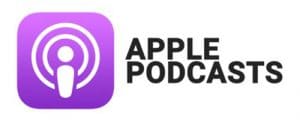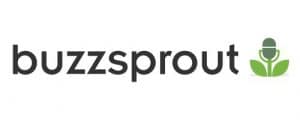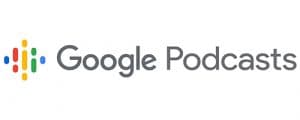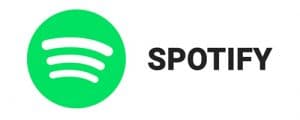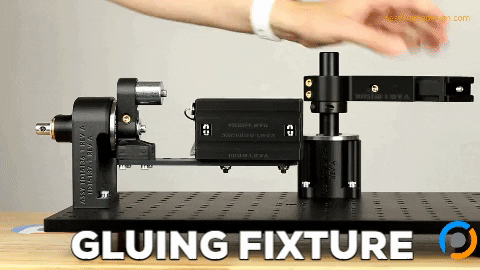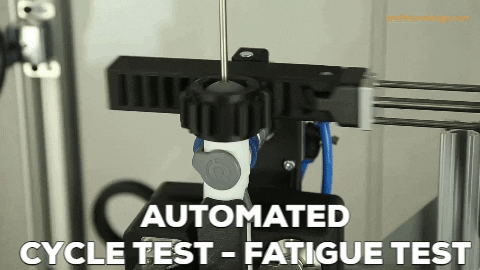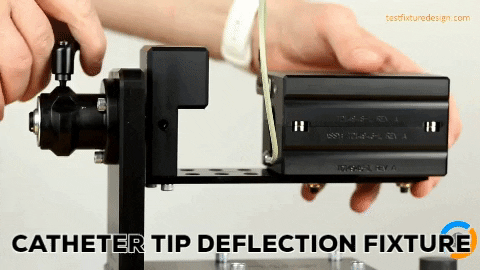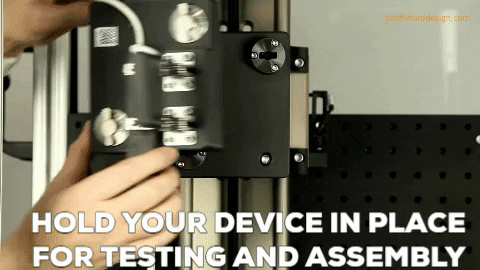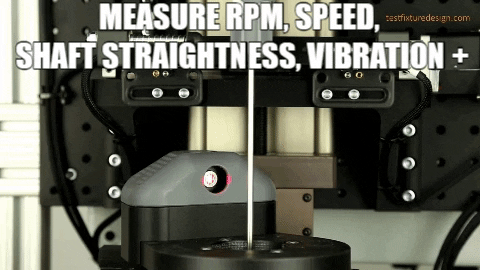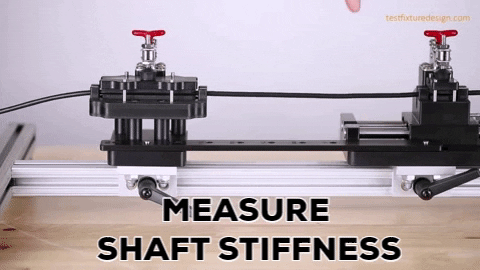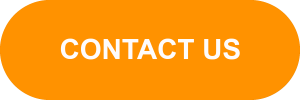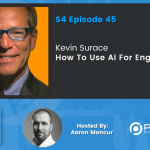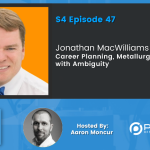S4E44 Dave Jones | Music, NASA, and Napkin Sketches to Circuits
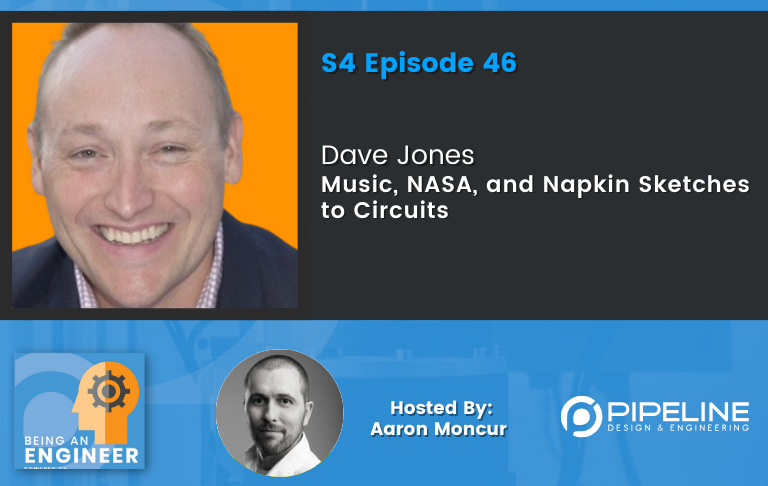
Who is Dave Jones?
Dave Jones‘ career mixed electrical engineering, music, a NASA joint venture, and entrepreneurship. His business provides engineering services specializing in taking electronics from napkin sketch to production ready. This episode will provide insights into blending unique experiences, problem solving, and running a business.
Aaron Robison, host
EXPAND TO VIEW EPISODE TRANSCRIPTION
SUMMARY KEYWORDS
work, people, customers, engineering, design, engineers, control, write, playing, family, projects, fantastic, nasa, business, team, hire, good, understand, band, smaller
SPEAKERS
Aaron Robison, Aaron Moncur, Dave Jones
Aaron Moncur 00:02
Getting custom manufactured parts can be a difficult task. Some local shops are great, but some require order minimums or just won’t pick up the phone if you aren’t a large company. That’s where xometry comes in. xometry is trusted by engineers and designers at NASA, BMW Bosch, and more. Simply upload the design file you want to be manufactured and boom. In a matter of seconds, you’ll get an instant quote and access to dozens of manufacturing processes like CNC machining, sheet cutting and fabrication, 3d printing, injection molding, and more. Plus, you’ll have plenty of delivery window options and prices available to suit your budget, worry less and get the parts you need manufactured but xometry so you can get back to building xometry for big ideas are built.
Aaron Robison 00:48
This is Aaron Robison from pipeline Design and Engineering. Today we are chatting with Dave Jones from DE design works. After getting a degree in electrical engineering. Dave began his career in 1999, at a NASA joint venture, and over the past 22 years, he’s focused on growing his business, which provides engineering services specializing in taking electronics, all the way from napkin sketch to production. On a fun and personal note, Dave says problem solving is what makes him tick. And in his leisure time he plays in a band. Thanks for having me. Yeah. So first question is, What instrument do you play? What kind of band is it?
Dave Jones 01:45
Yes, I was a jazz player. And I went to college on a performance degree playing upright bass. So that’s my my core instrument. But I also sing and play guitar. And so I’m playing lead guitar and seeing backups and playing in Oregon with my feet in a blues band right now. So
Aaron Robison 02:03
I was playing Friday night, very fun to come listen to you. And that not an engineer, but a cool engineer. So that’s inspiring for everybody, probably. So Dave, tell us what made you decide to become an electrical engineer?
Dave Jones 02:17
Yeah. And so as I mentioned, you know, I went off to college to be a musician and realized, you know, maybe that’s not there. There’s other opportunities out there that maybe I would enjoy as well. But in high school, I just I liked jazz band was my favorite class. But I did have a class in physics and really enjoyed that. And my great grandfather was a great uncle was Gene Autry. And then I had another great uncle who was FL may Tay Wow. And so lots of engineers, my dad was an engineer, my grandpa was an engineer. And so it just kind of made sense to trout engineering. And as soon as I got in there, I just loved it. And I really enjoy the the logic of things and putting things together. And it relates a lot to music with music theory, and how, you know, frequencies go together, and amplitudes and, and so on at that just I’ve kind of banded together with a lot of engineers throughout my career, who are also creative types and play in bands and things like that. And there’s just a lot of fun on that design side, front end creativity, where you can kind of couple that with engineering stuff. That’s neat. So
Aaron Robison 03:29
were you more dissuaded from music for a particular reason? Or you know, was like, hey, I need to get away from music read more called to engineering would you say are something different?
Dave Jones 03:38
Yeah, I think it was something different. I, it wasn’t a dissuasion, from music, it was just realizing that I needed to drop out of college and just move to New York. If I wanted to do anything with music. And I was coming. I knew I wanted to have a family. And you know, I grew up in the Midwest. And, you know, it was it was kind of one of those things. It’s like, Hey, I’m already here. I’ll basically a free ride to college, so why not stick around and do some other things? College was fun, right? It’s great. Yeah, yeah. I was still there some days.
Aaron Robison 04:10
Some days. Yeah. I hear. Yeah. So it was a really, it was really a practical choice. I mean, it sounds like you really had your head on straight up saying, hey, you know, what’s life gonna be like? Let’s, let’s figure this out as a big picture. Why it’s
Dave Jones 04:22
proof right here. You know, I’m, you know, playing in a band on the weekends, and I have a great career in engineering and I love my job. So it’s, and I still get to travel. So that’s
Aaron Robison 04:33
the well, hopefully that helps some listeners, you know, I mean, I remember for me, I feel like I always wanted to be an engineer. But even still, there’s choices but you know, you had some pretty vast differences and like a lot of people face that what’s what’s the path to take? So hopefully that helps people. Tell us a little bit more about you or your business really like some of the nitty gritty details and interesting details that we probably wouldn’t read about you on LinkedIn and your website. You know, those always have something Interesting Facts, but what’s the things that we wouldn’t know if we weren’t talking to you in person?
Dave Jones 05:04
Yeah, I think it’s just that. I mean, we have an amazing team here, right? There’s 2026 of us working together on projects and doing all kinds of industrial and medical device, product development things. But, you know, over the years, it takes a lot of hard work to have your own company writing, you’re starting your own company, you’re risking a lot, and, and you’re in the trenches. You know, you still have to work hard throughout your whole career to give me wrong, but there’s, there’s a lot more risk there d to you and your family. And you have to kind of weigh that in. And so I think that’s really it is that the reason we’re so good at what we do, and we have such a strong team is we work together, it’s kind of a family and you’re, you take on something to take it across the finish line for a costumer, and you gotta you gotta get it there. Right. So I think I think that’s the biggest thing is the the grit, but it takes it’s been at that Midwest, Show Me State kind of grid. So that coupled with the creative culture that we have here, I think, is the stuff that you may or may not see. But the once you work with us, you get it. So yeah,
Aaron Robison 06:17
yeah, you mentioned it’s kind of like family there. I’m curious, what approach have you taken in your business of, hey, let’s make this more of a family environment versus a team environment. You know, there’s certainly pros and cons to everything, what approaches me take it,
Dave Jones 06:30
I think about that a lot more now that the company is larger, but what early on when we were just starting, it was more of everybody needs to eat, let’s make sure and keep the projects rolling and, and things like that. So it becomes almost like a farmer mentality, right? You get at it, you gotta go out and get the job done every day. But at the end of the day, you’re you really enjoy the work. And it’s fun, and it’s exciting, and you know, nobody’s there to hand it off to you, right, you got to get it thought. And so, that’s the mentality of the team. And I think now, there’s a lot more, you know, people that lean on, and everybody can kind of count on each other. You know, so when you’re bringing up that first board, right, that’s the critical moment, he spent all this time drawing schematics, doing the layout, designing it, picking the components, making sure you can buy the components, making sure that the cost is the right fit for the customer and feature set and you bring up that board and then you’re you’re writing the software, right, you’re putting in that software so each at this point now it’s it’s less of a one person doing all the engineering, it’s a whole team of people leaving each piece right and you’re see you’re working together and and it’s really exciting to bring up that first board and get out up and run and see LEDs flashing, see communication. And then you’re doing the mechanical packaging around it, right. And so, you know, as as you start doing Project and Project and have all these parallel projects, you see things some, you know, we’ve done brain surgery equipment, we’ve done electric vehicle chargers, you know, stuff for agricultural drones, you know, control systems for HVAC things, furniture that has motors in it moves around, I mean, just all kinds of different variety of things. And so that that’s just a lot of fun. And you get to work on different things all the time. But it’s all our at least what we do is all around that circuit board. And then firmware and that core knowledge of, of that. And so we build up these libraries of reusable circuits and things so you saw one problem wants but we’re, you know, what, you need a USB charger, and all kinds of products that you need serial communications and everything, right, and Ethernet, you know, so it’s like, we’ve done that a million times. And not everybody who builds a medical device has done that, or, you know, or, you know, somebody who wants IoT wants to add it to their HVAC system or something like that. It’s they don’t know where to start, you know, what wireless should I use? Should I use Bluetooth? Or Wi Fi? Or Laura or Wi Fi Halo? Or what is Wi Fi Halo? Right? I mean, there’s a lot of items we’ve already used in three projects. So
Aaron Robison 09:17
so say specifically, we wanted to take a family or a team centric approach and your company but instead more this by being united around an objective and the work that’s just by default has brought you closer together to really have that type of environment. Yeah, and
Dave Jones 09:36
and we have a lot of comedians and musicians and characters around here, right. So it’s, it’s it’s a lot of fun, you know, everybody eats it’s a, you know, people are pretty down to earth and we were we have a good time. You know, there’s lots of joking and things like that, or what are you working through the day and so, we kind of have it by default. We just don’t hire people who aren’t fun to be around. You Yeah. Life’s too short, right? Yeah. We do that with our customers, do we align ourselves with customers that, you know, they have a purpose and right, you know, they want to develop products, but they’re also good people to work with. And, you know, nobody wants to get yelled at. And everybody’s on a timeline, right. So let’s, let’s all figure out a way to, to get it done and deliver the rights as quick as possible.
Aaron Robison 10:29
Let’s see if we can help people out with their careers. I think a lot of our audience is, you know, trying to figure out their career path, either it’s way ahead of them, or they’re at a junction. For some reason, if we go back to the beginning of your career, and you worked at NASA, I think in 99, of the joint venture, I mean, usually that’s you’re probably used to like, oh, wow, you’re, you’re a big deal. Right. You work for NASA. That sounds pretty admirable. What was your experience there at NASA?
Dave Jones 10:53
Yeah, I mean, it for interviewing purposes, I would say, Never underestimate your opportunity, right? So if you get a shot, go in and take it, right. I mean, I honestly I showed up for that interview, not I thought they’re not gonna hire me and I got a job. It was fantastic. So I had, I actually had, I was playing in a band touring around the country and graduated with my W E. And my wife was also a musician, and she got a full ride to go to Florida to go get her Master’s. And so I kind of I quit the band followed her down there and just to job interviews and happen to get an interview at NASA. So you never know what can happen. So you know, it can’t hurt to send somebody a resume and follow up and column right.
Aaron Robison 11:40
What kind of work did you do there? Yeah, so
Dave Jones 11:42
I was on the pad electrical team. So it was a Boeing Lockheed Martin joint venture that supported the shuttle program during ISS. So we, you know, we were able to basically, we, they hadn’t hired engineers for a long time, right. So I was working with all these guys that, you know, we’re in the development guys in the 60s at NASA. And so we they hired a whole bunch of young kids out of college at the time, right to kind of work with them and help promote the space program and all the software was being rewritten, the pad was being outfitted with all new sensors. And because they had all the ISS money, right, the International Space Station at that time, so he kind of remember all that happening in it, we were launching all the time, I mean, I was there for over 30 launches in like a three year period of days. And that’s a lot of mean. So I had an office under Launchpad B. And I had an office at the regular office and and I had a seat at the r&d Lab too. And so our responsibilities were the hypergolic, liquid oxygen and liquid nitrogen, all that for refueling all that anything electrical on the pad anything up to touching the vehicle. And so it’s a lot of sensors, a lot of PLC unit control things and on. So from an r&d standpoint, we had a funded project where I got to work with the Ex Works in like embedded systems. And so we took this old 1960s Launch Control boss, and we, we pull the data off of it. And then we would also take the, you know, all the new control, we actually be tested control logics for Allen Bradley. And so all of our rally bigwigs came in, they got to meet all those guys, I would take the data off off of control net and put it onto the launch pad system and then also pulled it off. So basically, we could, we had two systems, the old system and the new system in parallel, we could see that sensors and and so every time there was a launch, we had to work 24 hours a day, we had to have people monitoring the pad and fixing things going out of red crews in the bunny suits. And and make sure that we could fuel assist the bird and get everything ready so that when they are ready to launch, they could launch right and there. It’s a huge complex environment out there and so so anyway, he I sent him a little heads what he said, Nick control room with the headset, and they’d say, How’s your system ready? And when it came to you better be ready. Wow. But what I found there, you know, after being there for a year, and being in the control room for the launch, and it was and it was fantastic. It was great. You know, you fall in love with the engineering and all that again, and the space program was fantastic. But what surprised me is I really liked being in the lab, and and working with new technology and then trying to get married out the old I mean, that’s kind of what I do today. Yeah. And so they cut the funding for all that and so that I would probably would have never left the lab was fantastic. Just working with all the new stuff and just trying to figure it out and and make it all work together. So I’ll tell
Aaron Robison 15:00
your story then from, you know, being a musician, obviously, you said how you went down to NASA, on your wife and then getting in there. And then they cut funding. Bring us to now to your journey of how you decided to start your own business. I mean, that’s quite some jumping around.
Dave Jones 15:15
Yeah, so I did a little contracting down in Orlando, and then I get an opportunity to come to St. Louis. And of course, I was from St. Louis, my wife’s from Kansas City. So excited to come up, we knew we wanted to have a family someday. Lots of relatives, my dad who’s a power electronics expert lived here. And so I designed a, an automated welding line of equipment for a company. And after that was done, that was a two year project. And there wasn’t much design work to do. And I’m Jeff, definitely one of those front end design people, right. And so my dad, who was a, he had started a company out in Silicon Valley, and then came back to St. Louis at the time. And so I grew up with electronics in my basement, right? And my dad was a VP at Aberystwyth. So motor controls that kind of thing. And so he needed a little help on one of the kind of consulting projects he was doing, where he said, Hey, you, you know how to write code, right? Can you figure out how to program this microcontroller in controlled motor, and I said, that sounds like fun. So I just came over at nights and weekends. And over about a six month period, we had a very interesting control system up and running. And a company we were doing the work for, we had a lot of patterns and went very well. And then after that, people kind of started finding out that I could deviate embedded data C programming. And so I kind of learned a lot of that on the fly. I was, I think I had about a year’s worth of schooling on C programming and assembly language. And, and that was it, I was definitely a doubly so I understood how to read the data sheets, figure microcontroller, very low level, and we were doing field orientated, slide mode, observer, space factor, PWM stuff. So very enough intense motor control, and got it working. And half the time, I was just working on a project, I didn’t think it was a big deal. And later I found out that’s really hard. And so, from there, you know, I just I ended up getting a lot more customers to the point where one day I just came home when my son was about three months old and told my wife, I quit my job. So what spot? Yeah, why, you know, it just wasn’t a challenge where I was working. And I like challenges. So I worked out of the basement for a while and then had too much too much work and actually got colon cancer, which was fallen and chemo for a long time. And I became a project manager then. And so soon after that ordeal was was done, I said, You know what, I have a lot of customers, and we had a lot of 10, nine other people like me around the area that could could write code. And so we banded together, and I made them all full time employees went from there. And and so now we have about 26 employees. So
Aaron Robison 18:29
we make it sound easy, but I’m sure it wasn’t as easy then and you’re, you know, you can laugh and smile about it now, today, you had a company of 26 people, how much time do you still spend doing engineering versus really just running the business?
Dave Jones 18:43
Yeah, it’s so I would say I did, I talked to a lot of customers, and I tried to find out their pain points. Right. And, and a lot of times, people will, you know, they know their business. And, and it’s a great fit if they they have an engineering team that understands what they’re doing and the technical details and requirements, but it’s hard to pull that out, right? It’s actually a challenge to write a spec. And you know, and so from our viewpoint, we understand the reuse of schematics, firmware and integrating in brand new technology brand new sensors and wireless and things right so it’s what I find I do is I architect the solutions around the pain points and then we choose the proper technology right? So it’s solving the problem first not finding solutions for the tech for the hardware. I mean, it’s it’s what are you trying to do and then designing in what they really need and and then also Properly sizing the scope of work right? So identify the pain points and identify the risks, and then match your statement of work to the risk right so you’re you’re you’re always improving upon the business. case that way, and getting them to market fast. But also it allows for changes that allows for you know, that fail fast mentality. Right? So what are we most worried about focus on that, get that out of the way, and then you’re off and running, right? The brain surgery, guys were great for that. Because they didn’t know if if the technology was even going to work. And so we we got some off the shelf things we did proof of concept. The guy came in with a pig’s head and did surgery on a pig’s head and said, Oh, my God, this works fantastic. This is exactly what I want. And, you know, at that point, it was just some stuff on table, right? But we proved that the vacuum and using his gripper to pull out a flat in someone’s brain was very effective, and was much better than what was on the market. And then from there, that that made it easy, right? We just said, Okay, let’s go as fast as we can and develop a product. And so to really answer your question, I mean, it’s a mixture, right? So I’m working on the business case of other people’s businesses and the architecture, what do they need to solve the problem? So it’s still engineering. It’s just I’m not drawing a schematic today, I haven’t driven a drawing a schematic for four or five years, and I haven’t written a line of code in probably five or six years, but I’m still architecting new solutions. And it’s not just me, and there’s other people on our team, that help architect and then once it goes down to Okay, now we’re gonna start writing code, right? Our our software engineers aren’t architecting newest solutions.
Aaron Robison 21:40
That make sense. Yeah. So you’re staying, you’re technical in the sense of you can really speak to the solutions that you can help your customers with on their business case. You need to be technically sound in that regard. So that they understand. So you would have the provenance shaping it for the business? And then yeah, it’s
Dave Jones 21:57
the evolution of the of what I read on the on the job description. Right. I mean, I, I, it doesn’t make sense for me to write a USB driver. Yeah.
Aaron Robison 22:09
Right. So that begs the question, do you think somebody could use sales in your industry without being technical?
Dave Jones 22:18
It’s tough. I mean, so we actually have a position here. That’s, that’s quite unique. We, Bob is our creative technologist. And he used to run an advertising agency and has a marketing degree. And he’s fantastic at drawing these concepts. And, and, and then he does industrial mechanical design as well. Right. So he’s, but he’s, he has an art degree. And it’s, it takes a while to understand what we do and how we do it. But I would say that it, if you just have all the engineers, all, they all are going to it’s that squat, square, square peg and around all kinds of syndrome, right? Or Or think of the graphical user interfaces that are engineering developed right then aren’t, don’t have the art and creativity aspect. And so that’s really important to have both. And so you want non technical people to ask those questions. And, and anytime somebody says, Hey, I have a dumb question. A lot of times the engineers go, Yeah, I don’t I didn’t think of that. So it’s, it’s a good mix. You know, the world is round. There’s lots of different people in the world. And it takes a village, right, just like raising kids.
Aaron Robison 23:32
Yeah, thanks for that input. That’s a discussion that I’ve heard often times, and it’s good to get your take on it. Get the diversity there as well. How do you compete with lower cost businesses in other countries? Yeah, I think
Dave Jones 23:46
the timezone is a thing. And, you know, we what we offer is IP ownership. Right? And I mean, we’re just, we’re just very transparent with customers. So it takes a collaboration that you can’t just design in a in a vacuum. Right. And, and so I think that’s really important, and the communication barriers that exist, and the time difference and things like that. I mean, you know, small and medium sized companies just in, you know, they can’t deal with that, right. I mean, maybe some large companies that have an entire style, which went overseas. But we see that too, I mean, we’re working with teams overseas. So now we don’t subcontract to any I mean, we’re a US company, and we do all of our work internally, right, except for maybe pulling in a few software resources or something. But it’s all US based all US people and we’re all in the same times. Just kind of it doesn’t, it doesn’t become a competition thing, because we’re designing rugged things that are designed in the US. And so it’s just a different market, right. I mean, there’s a market there’s plenty of work for everybody, right? I mean, we still don’t have flying cars. ours. So we there’s a lot of engineering work to do now, but it’s hard. I mean, hardware is hard to do. And there aren’t enough software resources in the world that can actually do a good job of writing real object oriented. Well, well structured go well documented code that’s supportable. It’s sustainable. So there’s plenty of opportunities in engineering. Absolutely. And anybody that says AI is going to take away all the software jobs, I haven’t met any software programmers, I know that.
Aaron Robison 25:34
I do dabble in home projects and some other things, and it will have gotten AI to generate code for B, but not that works.
Dave Jones 25:41
Yeah, well, it’s a tool a, you know, you want to have great tools. It’s a brand new, excellent tool to use, right? But it’s not, when we get flying cars, then I’ll then maybe I’ll expect that we won’t need programmers after that. That’s, that’s
Aaron Robison 25:57
the Holy Grail is flying cars. That’s good enough. Yeah, we’re gonna do a real quick break just to share that team pipeline that US is where you can learn more about how we help medical device and other product engineering or manufacturing teams developed turnkey equipment, custom fixtures, and automated machines to characterize, inspect, assemble, manufacture, and perform verification testing on your devices. Today, we are talking with Dave Jones from D design works. And he was just sharing a lot of his background, and hopefully that will get flying cars one day, but thinks that’s a long ways off. So that’s, that’s when we know that we’ve arrived Not, not there yet, with AI. Yeah. years a little bit and go to education. So knowing what you know, now, after owning businesses, and working in this industry for a long time, what’s a class that you would add to university engineering curriculum,
Dave Jones 26:55
I think there’s still a gap for embedded firmware in general, especially in feedback control, all real time systems, and maybe the architecture of different systems trying to think about it that way. Because I think, maybe they eat at the school level, there’s some thought of, you know, the Raspberry Pi’s writing, Python can do everything, right. And that’s not really true. And then the other side of that coin is, you know, they’re still teaching assembly language, right. And you need to understand that as a basis, but at least where we live see programming is, is that’s the tool at that low level, microcontroller and NP level. And if you can do that, I feel like you can do anything, it’s hard to go the other way, if you start at web programming, and try to understand real time control, it’s tough. So I would say that a true firmware, real time control feedback control system type of class would be fantastic to add. And then also just had a bit of business finance or something like that. Just understanding the you know, how that works. You know, how do you go get a loan it start your own business and what to watch out for? And
Aaron Robison 28:16
those are almost specialty classes, you have to take sort of on the side if you want to get them right, if you can, if there’s even a class available? Yeah. Okay. So if you’re going to add that class, you can add without taking away what class would you take out of the university curriculum?
Dave Jones 28:32
Gosh, I’m not really sure what to take out of there. I think that there’s a lot of classes that that aren’t really needed. But that’s a whole nother topic about, about universities. So.
Aaron Robison 28:47
And it might be different now to I don’t know if you’re staying up to date on classes or not. But yeah, I think about what I use what I don’t use a lot of it’s relevant, and somewhat less so. So you’ve hired a lot at least 25 people, I’m sure it’s been more than that. When you’re hiring. Can you describe what it is that you’re really looking for? You said obviously, you know, I think you said if they’re not fun to be around. Yeah, you know,
Dave Jones 29:11
I mean, just good people, right? I mean, the people who are caring that, you know, they care about the project, they care about the work, you know, we definitely don’t hire anybody that’s I just want a job. I want to clock in clock out, we’re not the place for that. You have to just get excited and light up and maybe you want to work with with circuit boards when you want to write code. And and you’re always learning, right? I mean, somebody who’s who’s doing their own hobby projects and can’t sit still, you know, that’s fantastic. That’s the kind of energy we want here. And then, you know, we do have a fantastic Co Op and internship program here. And all that’s on our website at D design works and, you know, we take you know, anywhere from one to three co ops and We hire a lot of them. So we it’s kind of all small organic growth, we’re not trying to get too crazy and on but you know, I, we usually we try to take co ops, right, but we did actually have a summer intern here. And we just, we do a lot of r&d projects. So you’re getting time hands on time in the lab, you’re working with a lot of different types of engineers, and we put them to work. So if you’re coming here for an internship, you’re going to be working on something. And then you know, a lot of our customers get some free labor out to you all that experience and and we’re doing everything from really low level embedded micro Linux kind of gateway things, and then cloud development things to but it all has to our kind of rule of thumb is we take projects that touch the hardware have something to do with the hardware, right, so a lot of IoT connectivity. And so, so yeah, we do write Ipin apps and things. But that’s not something we push, we just because, you know, we have people that that’s what they do, and that’s that they’re fantastic at that, and we know where our, our focus is. So
Aaron Robison 31:12
that’s good. So it sounds like I think sometimes an internship or Co Op program is viewed as an investment in the future and yet going to be, you know, pretty big burden. But it sounds like, you know, maybe there’s a little bit of that, but you’re getting valuable work out of them. And pretty soon they become viable employees. Is that correct?
Dave Jones 31:28
Yeah. Yeah. I mean, that’s the that’s the idea. That’s why we do it. We’re, I mean, we give it back to the community and other ways to sponsor and robotics clubs and things like that. But it’s, at the end of the day, we’re choosing people that we have hope to hire, but also, you never know, right? I mean, at the end of the day, I remember I we were talking about when I was coming out of college random and I was playing in a band. So are you I don’t expect them to know what they want to do when they get to my age yet. So yeah.
Aaron Robison 32:01
What are some of the hardest aspects of business? I mean, it sounds like things are just great. And everybody would want to work at D design works. But I’m sure there’s been challenges, what what do you find to be really hard? Yeah,
Dave Jones 32:13
a number of things. I mean, at the end of the day, starting your own business, you have to be prepared to, you know, write proposals, chase people for money, those kinds of things, right. And just because you do a project doesn’t mean that someone’s gonna send you a check. So you have to you have to do a good job, you have a good contract, you have to work for people that are going to pay the bill. And so alignment of customers and so, you know, you, you, you figure that out, as you as you go, and I’m you know, I can see you’re shaking your head, right, it’s you everybody gets some customers, that’s all Yeah, okay, we’re gonna do this and, you know, the world happens and things happen, right? COVID happens and, you know, we’re we’re shutting our doors, right? Oh, sorry. And so you have to be prepared for that. And you have to be able to weather that storm. So sometimes that’s tough and, and, you know, luckily, we’ve never, we’ve never downsized, we’ve always you know, even during COVID You know, we just we did a lot of research projects built up our core worked on our processes and things like that and didn’t lay anybody off you know, and then the other you know, their challenges or or you know, just in general with life balance and things like that right I mean, we do kind of hybrid working so there are times when we’re you gotta stay late get the job done and and really put in the extra hours but there’s also a lot of flexibility you know, work from home and you know, at the end of the day, he tools like this are just fantastic because you can even collaborate online, you don’t have to be sitting in escrow anymore, which is great.
Aaron Robison 33:56
So it sounds like you kind of keep coming back to adaptability of yeah, there’s some hard but there’s always ways around it all right on that one let’s go to the kind of the magic wand question if there was a tool that doesn’t exist but if it did, would allow engineering teams to work better faster smarter.
Dave Jones 34:13
Yeah, I feel like at the check notes on that. I think I said sure. shrink ray was what I was in Yeah. So everybody wants it smaller, cheaper, faster, you know, that kind of thing. Right? So if we can just shrink everything and that that’s a that would be fantastic. So you know the silicon guys are working on that for us and and that keeps us busy because if you can make your product to a quarter of the size in a few years then that’s another project for us and we love that would that
Aaron Robison 34:50
get us flying cars
Dave Jones 34:53
maybe it well, I any aerospace kind of things are the weights right? Because you know so that that’s he Huge is is the cost and weights?
Aaron Robison 35:02
Yeah, if you do energy, storage, smaller, lighter, that’s
Dave Jones 35:06
how it was the space, they should I forget what the number was, but they had a calculation where it was like every, you know, every ounce or something like that cost another, you know, $800,000 or something like that in an open space. So I, some of the trends you’re seeing in industry, so people trying to go smaller, for sure, but what else are you seeing in your industry? Yeah, I think Rf is is a is a thing, there are some new RF technologies out there. And so trying to figure out how to make that better, right, and we’re at the end of the day, everything’s connected. And so that that IoT buzzword is very real for us, where the and it’s not going away, right, nobody’s got a silver bullet. At the end of the day, RF is never going to be 100% Perfect. So you just have to have great error handling, you have to have use the the latest technology to try to work through the issues of, of retries. And getting more range and getting smaller size by having less less battery, you know, some more efficiency and power electronics. And just power electronics in general as well. Right? They’re getting getting smaller, there’s some new, you know, silicon carbide type devices, but there’s trade offs and in every engineering decision, so things are continuously changing, and, and even the regulations, right, I mean, the regulations around medical device, home health, that’s, that’s all changing, right? And is very much impacted with, you know, there’s work from home. And so all those kinds of things affect the kind of products that people want, and the way they’re using it, and the need for data analytics in the cloud. So how do I get the communication out there, interoperability of communications, all the different things like ether, cat, and prophy, then prophy, bus and Ken Boston. So we do all that kind of stuff. There’s a lot of work there, where it’s, let’s add some connectivity to our products, right? Whether it’s wireless or wired, there. So there are a lot of choices, right? And so you need to have those conversations with your customers to make sure they understand. You know, Bluetooth is just you just drop that in now, right? Everybody’s got Bluetooth on everything, but what are you going to do with it? And how is the user going to interact with the device? And let’s make sure that solid, make sure that’s what the user wants? And they’re going to what’s the value of the data that they’re getting out? And how are they going to use it? So that we make sure and we don’t put a gig of memory on something if you don’t need it? Right? Let’s, let’s, let’s make it make sense. And choose the components that makes sense for for what you’re doing and make a platform or, or whatever is needed for the future, right for that ecosystem. And so I love that. I love working with customers and asking questions, and then helping them develop the roadmap. And that’s like, free advice they get by working on projects with us, is I ask a million questions. So eventually, they, you know, eventually we figure out what they need to do and what they want. And it’s great. And I love seeing that, you know, years later seeing, seeing how we’ve helped these customers and, and they just give us project after project because we do a good job. And my team is fantastic. And so at the end of the day, you want to get it across the finish line. And that’s that’s our main thing that we try to work on. So
Aaron Robison 38:43
it sounds like you definitely see that there’s no shortage of work. I mean, when you describe all of those, these are all huge problems to standardize on to figure out how to integrate, and yeah, never any. Good. Getting back to the kind of as we wrap up here more to the personal side, how well do you think you’ve been able to balance the demands of being a business owner, which are huge, with personal and family responsibilities?
Dave Jones 39:06
Yeah. Well, I, I’d like to say I’ve done a pretty good job that I don’t know. So but I’m still married, so that’s good. Yeah, you know, you have to do that. You carve out time, right? I’m an advocate for doing like, weekly planning with my family, I would do weekly planning really kit is what we’re doing this week, you know, grocery stores and stuff. And so, you gotta have you gotta set some goals. And so, you know, every year you set, set some goals and say, I this is why I want to do have a bucket list and it’s okay, that stuff can change. But one, one thing I’ve done is I make sure for a week I the family goes on vacation, that’s it, and I’m out I turn off my phone. Sometimes we even go out of the country or something and so it’s just kind of completely removed. And I think that’s really important and I encourage all my employees do that too. And, and everybody does, you know, I think, post pandemic, right, but for me it was post cancer. I mean, I spent 10 years getting my business off the ground. And when that happened, can you kind of realize, okay, I need to need to do some other things. So, you know, but yeah, if you if you don’t, you’re you look up, and it’s 10 years later, and the kids are out of the house, and you didn’t ever see him. So and in what what’s funny, too, is that, you know, everybody wants everything done tomorrow. So you, it doesn’t change, right. So you balance your time, and prioritize what you need to get done. And people and communicate, right transparency, that customers transparency with employees, and at the end of the day, you’re going to have, you’re going to work with people that, you know, they’ll pick you up when when you need them to and with customers that understand, you know, what’s, what’s needed, and you stay late and knock it out when you need to. And if it’s a you want to go on vacation for a week, they’ll understand it’s okay.
Aaron Robison 41:17
Dave, what is it that brings you joy? And this could be work, personal family could be anything? What is it that brings me joy? Yeah,
Dave Jones 41:24
from a work standpoint, it’s seeing projects go out the door and seeing things in real life that we’ve worked on. Right. And I think that’s fantastic. And, and, you know, personally, it’s it playing music and spending time with the family. Of course, that’s everybody’s answers and the time with family, right. But I’ll give you an example. Right? I mean, then back to the stroke, surgery, brain surgery stuff, right? I mean, I just remember a video and I might one of my customers posted their clinical trials. They showed there was an 80 year old lady that was came in and and they said she would have lost all of her leaden functions and but they use this device that we had designed, right, and they pulled the clot out, and she walked out of the hospital the next day, and then
Aaron Robison 42:15
especially if it helps people, yeah. How can people get in touch with you? Yeah,
Dave Jones 42:19
so I mean, my email is Dave@dedesignworks.com. So that’s my direct email. But in general, just, if you have a project you’re working on info@dedesign works.com goes to a bunch of us so we can respond quickly. And if you’re interested in a co op, or something like that, HR@Dedesignworks.com we’re always looking to hire and you know, somebody who’s real, real talented, especially if they want to live in St. Louis, Missouri. Lots of outside trail riding and things to do here. So it’s, but yeah, I mean, a will look us up on our website, Dedesignworks.com.
Aaron Robison 42:57
Great. Thank you so much for your time, Dave.
Dave Jones 43:00
Thank you. Appreciate it.
Aaron Moncur 43:01
I’m Aaron Moncur, founder of pipeline design and engineering. If you liked what you heard today, please share the episode. To learn how your team can leverage our team’s expertise developing turnkey equipment, custom fixtures and automated machines and with product design, visit us at teen pipeline.us Thanks for listening
About Being An Engineer
The Being An Engineer podcast is a repository for industry knowledge and a tool through which engineers learn about and connect with relevant companies, technologies, people resources, and opportunities. We feature successful mechanical engineers and interview engineers who are passionate about their work and who made a great impact on the engineering community.
The Being An Engineer podcast is brought to you by Pipeline Design & Engineering. Pipeline partners with medical & other device engineering teams who need turnkey equipment such as cycle test machines, custom test fixtures, automation equipment, assembly jigs, inspection stations and more. You can find us on the web at www.teampipeline.us

